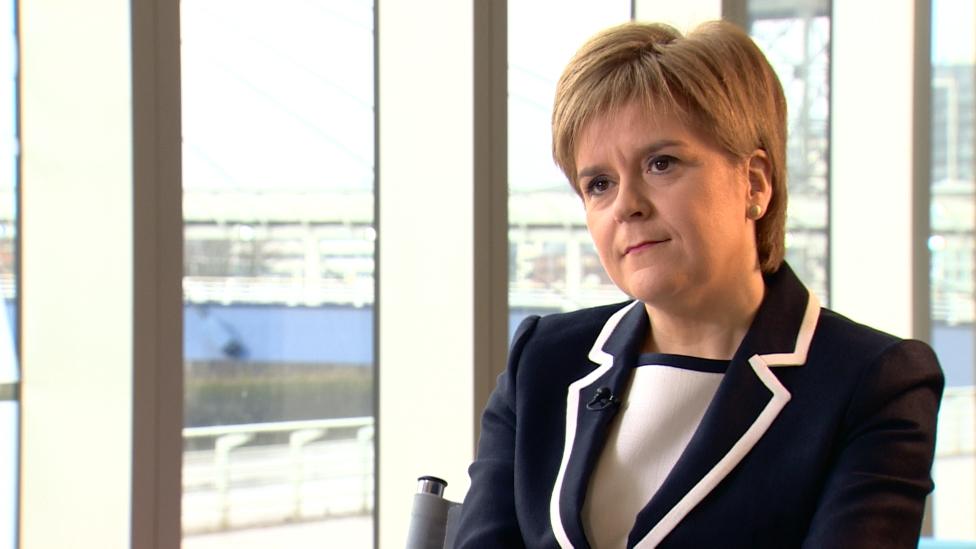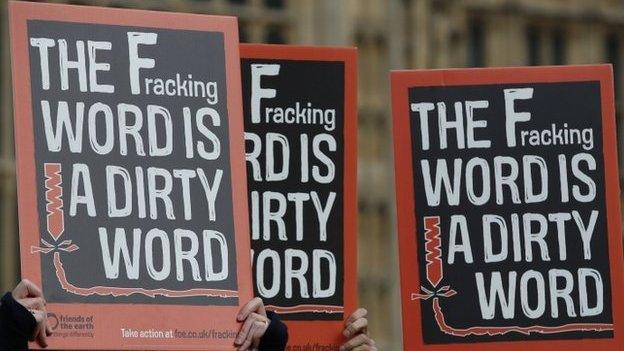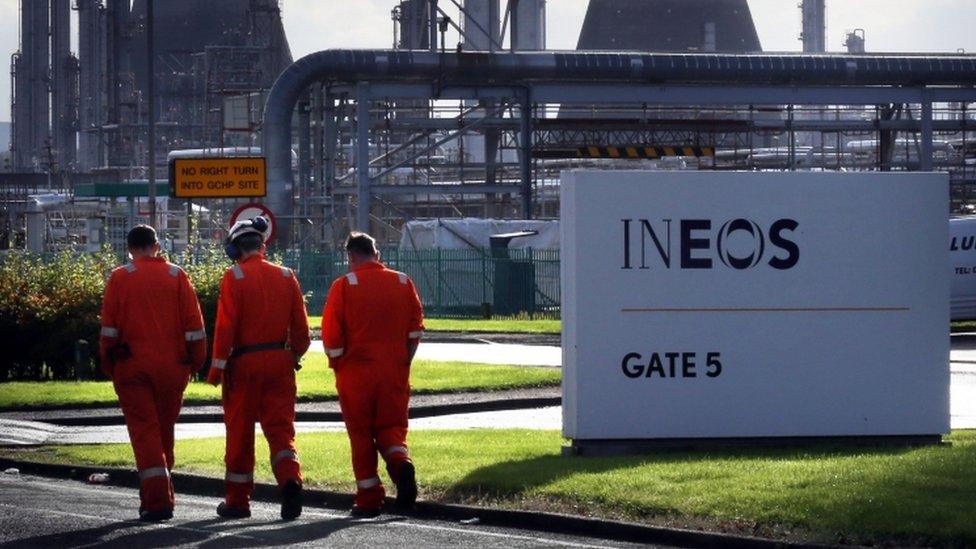Nicola Sturgeon 'highly sceptical' about fracking
- Published

Ms Sturgeon told BBC Scotland that she had "big questions" over the potential impact of fracking
Nicola Sturgeon has again said she is "highly sceptical" about fracking, but no decision on whether it should be banned will be taken before next year.
The Scottish first minister was speaking ahead of the SNP conference, which will be held in Glasgow over the weekend.
Anti-fracking protestors, including a grassroots SNP campaign group, are to demonstrate outside the conference.
They will call for Scotland's temporary ban on fracking to be made permanent.
Health implications
The Scottish government imposed a moratorium on onshore unconventional oil and gas - which includes hydraulic fracking - in January of last year.
It later announced a separate moratorium on underground coal gasification (UCG) - a technique which Cluff Natural Resources had been planning to use to extract gas from under the Firth of Forth near Kincardine.
Ministers have said the temporary bans will remain in place while the full environmental and health implications of the controversial techniques were examined.
The BBC's David Shukman explains how fracking works
Some grassroots SNP members want to see an outright ban introduced - a position that is supported by Scottish Labour, the Scottish Liberal Democrats and Scottish Greens.
Supporters of fracking have said shale gas could revolutionise manufacturing in Scotland, creating tens of thousands of new jobs.
Speaking to the BBC's Good Morning Scotland programme, Ms Sturgeon said a final decision on whether fracking should be completely banned would be taken once the study was completed next year.
'Look in detail'
But Ms Sturgeon, who is also the SNP leader, said she had "big questions" about the impact fracking could have on health, the environment and local communities.
She added: "What we have done is I think right. We have set in place a number of strands of work to look in detail at these things and in due course we will take a decision in the next parliament.
"I am not going to at this stage pre-empt the outcome of that work, but I am saying very clearly I am highly sceptical about fracking for all of the reasons I have just set out."

What is fracking and why is it controversial?

The fracking method of extracting gas is fiercely opposed by campaigners
Fracking is the process of drilling down into the earth before a high-pressure water mixture is directed at the rock to release the gas inside.
The extensive use of fracking in the US, where it has revolutionised the energy industry, has prompted environmental concerns.
The first is that fracking uses huge amounts of water that must be transported to the fracking site, at significant environmental cost.
The second is the worry that potentially carcinogenic chemicals used may escape and contaminate groundwater around the fracking site.
But the industry suggests fracking of shale gas could contribute significantly to the UK's future energy needs

The first minister said companies such as Ineos had been given licences to frack in Scotland by the UK government before the powers were transferred to Holyrood.
She added: "We have to make sure we do proper detailed work. If we were to simply take a decision to ban without doing that work then we could leave ourselves open to legal challenge."
A coalition of anti-fracking campaign groups are to gather outside the main entrance of the SECC ahead of the start of the SNP conference on Saturday morning.
They will include the SNP Members Against Unconventional Oil and Gas (Smaug), external group, which said on its Facebook page that it aimed to create a family event, with everyone invited to wear some sort of hat and carry a banner.
'Mounting evidence'
The group said it wanted to "highlight to SNP members and officers the strength of feeling in local communities against all forms of unconventional gas extraction".
And it said it wanted to "remind the party that at the last count 75% of SNP members are opposed to unconventional gas extraction".
The group added: "With mounting evidence from around the world as to the dangers of unconventional gas extraction, it seems highly unlikely that an impartial enquiry could find it safe in the foreseeable future."
It follows a major anti-fracking protest last October, which saw nearly 2,000 people link hands across the Forth Road Bridge.

Ineos, which operates the Grangemouth petrochemical plant, has fracking exploration licences for a large area of central Scotland

Scottish Labour MSP Sarah Boyack said one of the studies into the impact of fracking was being carried out on behalf of the Scottish government by the British Geological Society, which she said had previously stated that fracking is a "pretty safe activity".
In a letter to the first minister, Ms Boyack said: "Scottish Labour is clear - no big reports, no ifs, no buts, no fracking in Scotland.
"I am writing today to seek a straight answer to a simple question - if the research comes back saying fracking is safe, will you end your temporary freeze in fracking?
"If not, will you back Labour's call for an outright ban?"
Ineos, which runs the Grangemouth plant, has acquired fracking exploration licences across 700sq miles of central Scotland.
The company proposes using shale gas as a raw material for its chemical plants, and has revealed plans to put millions into exploration.
Ineos has warned that a ban on fracking would see Scotland pass up an economic lifeline that could compensate for dwindling North Sea oil and gas reserves.